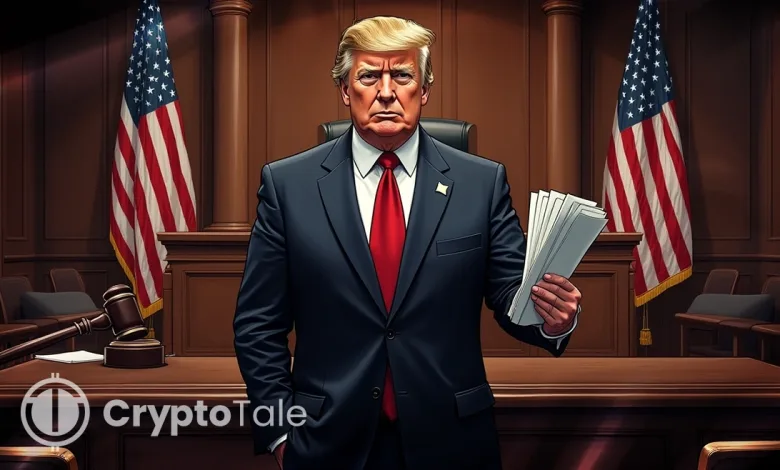Trump Revives GENIUS Act After House Vote Fails By Securing 11 Votes

- Trump met GOP leaders to revive the GENIUS Act and secure votes needed for passage.
- The House prepares for another stablecoin vote during this key Crypto Week push.
- The GENIUS Act could bring clear rules for digital assets and boost the US financial edge.
President Donald Trump announced late Tuesday that House Republicans have agreed to advance the GENIUS Act after a high-stakes Oval Office meeting involving key congressional leaders. This development comes just hours after an earlier procedural vote tied to the legislation failed in the House by a margin of 196 to 223. The president confirmed that 11 of the 12 necessary Republican votes are now secured, with Speaker Mike Johnson joining the meeting remotely and signaling support to move forward swiftly.
Republican Push Gains Traction Amid Earlier Resistance
The initial vote on Tuesday collapsed due to internal GOP conflict. Hard-line House Republicans, particularly members of the Freedom Caucus, objected to advancing a procedural rule that would have allowed combined debate on the GENIUS Act, the Clarity Act, the Anti-CBDC Surveillance State Act, and defense funding. They demanded that the bills be separated before moving forward.
President Trump responded by holding a private discussion in the Oval Office with 11 Republican members. According to a Truth Social post, all agreed to vote the next morning in favor of the rule. The Speaker of the House, Mike Johnson, reportedly participated via phone and confirmed plans to expedite the process. Trump publicly thanked the lawmakers for their “quick and positive response.”
The GENIUS Act, which already passed the Senate with a 68–30 bipartisan vote in June, establishes the first federal framework for regulating dollar-pegged stablecoins. It grants regulatory authority to the U.S. Treasury and requires stablecoin issuers to maintain dollar reserves, undergo financial audits, and comply with both federal and state-level oversight.
Stablecoin Regulation and Digital Dollar Policy Take Center Stage
The GENIUS Act’s passage would create a regulated pathway for private companies to issue digital dollars, with oversight from federal authorities. Treasury Secretary Scott Bessent believes the bill could expand the current $238 billion stablecoin market to more than $2 trillion. While the Senate embraced the bill with support from both parties, Democratic members raised concerns over Trump’s past crypto investments.
Opposition within the GOP largely stemmed from the bill’s omission of an anti-CBDC clause. Hardliners wanted language to explicitly ban any Federal Reserve–issued central bank digital currency, which they view as a threat to financial freedom. Despite that, Trump remains focused on pushing a “clean” version of the stablecoin bill without amendments or attachments, further distancing it from broader crypto bills.
The legislative impasse also delayed two additional proposals: the CLARITY Act and the Anti-CBDC Surveillance State Act. These were expected to accompany the GENIUS Act under the “Crypto Week” legislative banner led by House Republicans. GOP leaders framed the trio as crucial to determining whether digital tokens fall under securities or commodities law, and to stopping government-issued digital currency.
Related: Crypto Firms Urge Congress to Pass CLARITY Act During House Session
Emmer Reaffirms Crypto Week as Regulatory Pivot Point
House Majority Whip Tom Emmer reaffirmed that the week marks a pivotal turning point in the U.S. digital asset strategy. During a public event, Emmer stated, “This week we are delivering on President Trump’s promise to make America the crypto capital of the world.” His remarks reflected the GOP’s broader momentum toward regulatory clarity.
Alongside Emmer, House Financial Services Chairman French Hill, and Speaker Mike Johnson have continued to promote Crypto Week’s legislative goals. The initiative aims to support private sector innovation, ensure consumer protections, and safeguard the dollar’s international role. With procedural backing restored and Trump applying pressure for rapid action, the House is poised to revisit all three proposals in the coming sessions.
The central question now becomes: Will GOP leadership succeed in keeping the GENIUS Act clean, or will internal demands force amendments that risk delay?




